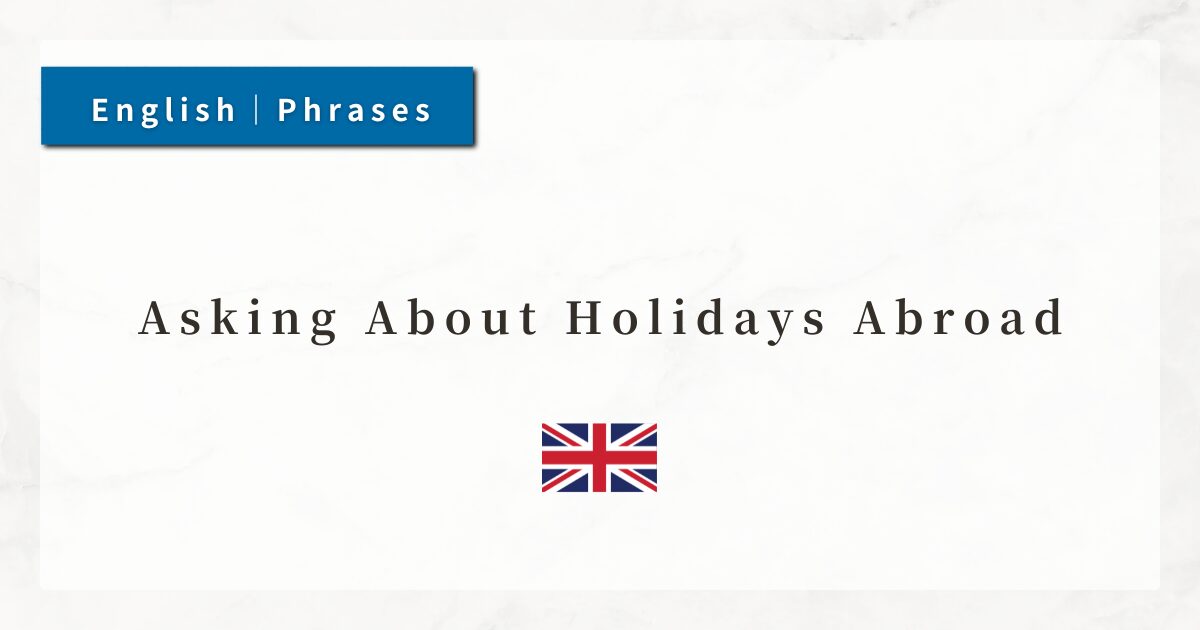#11 Asking About Holidays Abroad|English Conversation Phrases

When traveling, attending a language school, or joining online English lessons, it is common to talk about national holidays in different countries.
For example, questions such as “What holidays are celebrated in this country?”, “What do families usually do?”, or “Do people exchange gifts?” can help you learn about cultural differences and customs. These conversations also allow the discussion to flow more naturally.
In this article, I will introduce useful phrases for asking about holidays abroad, example responses, and tips for expanding the conversation.
Dialogue

Do you celebrate any national holidays in your country?

Yes, we have several. The biggest one is Independence Day in July.

How do you usually celebrate it?

We have fireworks, barbecues, and family gatherings. It’s a fun day!

That sounds great! Do you give gifts like at Christmas?

No, not really. It’s more about spending time together.
1. The Basic Verb “Celebrate”
The verb celebrate means “to mark or honor a special day in a joyful way.”
It is commonly used for birthdays, anniversaries, holidays, and other positive events.The usage is simple: celebrate + noun.
- We celebrate Christmas with our family.
- They celebrated their anniversary last weekend.
The verb also carries the nuance of enjoying or sharing a positive moment, so it can be applied not only to religious or national events, but also to personal occasions such as graduations, new jobs, or the birth of a child.
2. Asking “Do you celebrate any national holidays?”
The phrase “Do you celebrate any national holidays?” shows interest in the culture and traditions of another country.
- Do you celebrate any national holidays?
The word any softens the question and implies “even if it’s just one, please tell me.”
- Are there any important holidays in your country?
- What national holidays do you usually celebrate?
3. Asking About How It Is Celebrated
The structure “How do you ~?” is a standard way to ask about actions.
- How do you usually celebrate it?
By saying “How do you usually celebrate it?”, the adverb usually emphasizes common traditions or habits.
- How do you spend the day?
4. Asking About Gift-Giving
This phrase checks whether gift-giving is part of the holiday.
- Do you give gifts like at Christmas?
Adding “like at Christmas” provides a clear example, helping the other person understand what kind of custom you mean.
- Do you give gifts on that day?
- Is it common to exchange presents?
Through such questions, you can learn about cultural practices and values in more depth.
5. Explaining the Meaning of an Event
The structure “It’s about ~” is used to explain the essence or purpose of an event.
- It’s about remembering our history.
- It’s more about family than religion.
By using this expression, you can explain cultural perspectives in a polite and meaningful way.
Summary
- Do you celebrate any national holidays?
→ A natural way to begin a cultural conversation. - How do you usually celebrate it?
→ A useful structure for asking about traditions. - Do you give gifts like at Christmas?
→ A question to explore cultural differences in gift-giving. - It’s about spending time together.
→ A simple way to explain the meaning of an event. - Celebrate / fireworks / gatherings
→ Useful vocabulary for talking about holidays and celebrations.






